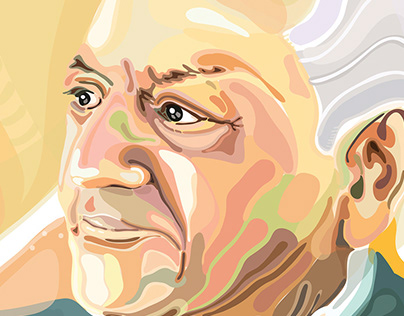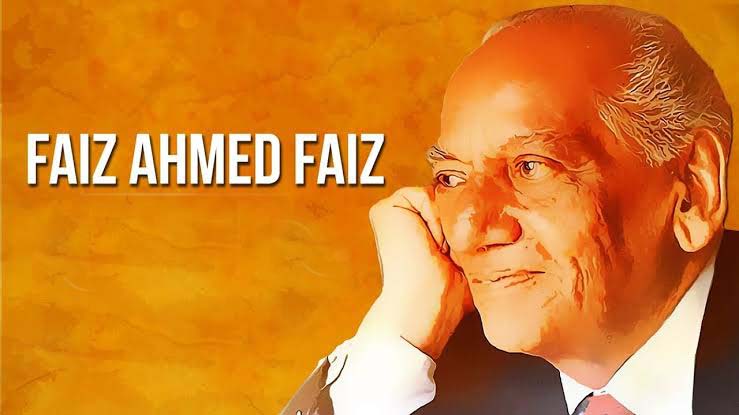This is my second blogpost on Faiz Ahmed Faiz – the most iconic Urdu poet of the 20th century. Faiz has been my mode of expression and the medium to understand myself better in the recent times. For the very adventurous life that Faiz lived – being born in undivided India (now Sialkot, Pakistan); falling in love with a girl at a young age; getting separated from her for higher education and work; know her getting married to someone else; discovering oneself while he taught, lived and became the Faiz the great poet we know in Amritsar; witnessing the horrors of India-Pakistan partition; being imprisoned for being the voice of freedom in his own country; falling in love again and then see his country find and make itself while he concluded his life – such a range of experiences enabled him to express an array of emotions that all of us experience in our lives.
I choose to dedicate this post to one such emotion – yearning – that I believe Faiz expressed and voiced so strongly because of his experience with love (and consequently heartbreaks) and his desire for freedom while he was imprisoned by the then Prime Minister of Pakistan Liaquat Ali Khan for being a liberal and progressive voice. Faiz composed several ghazals and nazms while he longed to reunite the first love of his life in Sialkot (ironically ended up composing a nazm addressed to her husband) – each of which has a unique intensity of hope of somehow ending up with her together in this lifetime. He wrote volumes of poetry while he was in prison yearning to be free and see the sun in open skies devoid of iron bars. In this post I will try and transliterate a few ghazals of Faiz which according to me articulate yearning in its purest and most intense form.
Dil Ki Khair
This simple to understand ghazal of Faiz was recreated and popularized by Ali Sethi in a music video in 2020. In Dil Ki Khair, Faiz is asking himself rhetorically as to how long will she make him wait for her. Whatever little I have understood about Faiz so far, he seems to be a very decent and shy guy and hence he keeps writing to himself, avoiding to be too direct most of the times and keeps expressing his love in softer expressions (unlike an Ahmed Faraz who is the Shahrukh Khan of shayars – opens his arms wide open in poetry making his love known to the world). Here we go:
kab tak dil kī ḳhair manā.eñ kab tak rah dikhlāoge kab tak chain kī mohlat doge kab tak yaad na aaoge
How long should I be grateful to my heart for its patience, how long will you make me wait;
How long will be peace; how long will I not remember you?
biitā diid ummīd kā mausam ḳhaak uḌtī hai āñkhoñ meñ kab bhejoge dard kā bādal kab barkhā barsāoge
The season of hoping to catch a sight of you seems to have passed; my eyes out of yearning for you have now have dust in them;
When will you send back the clouds of pain; When will you make it rain?
ahd-e-vafā yā tark-e-mohabbat jo chāho so aap karo apne bas kī baat hī kyā hai ham se kyā manvāoge
ahd-e-wafa: promise to be together (basically a “yes”)
tark-e-mohabbat: end of love (break up)
To say a yes or to break up – the decision is solely yours
Both of these are beyond my capacity, what will you make me confess/admit/do?
kis ne vasl kā sūraj dekhā kis par hijr kī raat Dhalī gesuoñ vaale kaun the kyā the un ko kyā jatlāoge
vasl: union (with beloved), hijr: separation (with beloved), gesuon: hair
Who saw the sunrise of union, on whom did the night of separation set?
What did the girl the with beautiful hair mean to you – what will you tell her?
'faiz' diloñ ke bhaag meñ hai ghar bharnā bhī luT jaanā bhī tum is husn ke lutf-o-karam par kitne din itrāoge
Oh Faiz the destiny of hearts have both – fulfilment and emptiness
Until when will you enjoy the rewards of this beautiful phenomenon/sequence/traits of love?
Yes, this a supremely beautiful Nazm. Want to hear it musically? Embedding Ali Sethi’s version below:
Nahin Nigaah Mein Manzil:
This ghazal also is a part of Faiz’s collection – Nuskha Hai Wafa. He wrote it while he was prisoned during Liaquat’s regime. He is talking about being free some day and he is also talking reuniting with his love some day. Longing and yearning overflow in almost every sher of this ghazal. Here we go:
nahīñ nigāh meñ manzil to justujū hī sahī nahīñ visāl mayassar to aarzū hī sahī
If the destination/goal is not in sight; let’s keep on seeking it;
If union (with beloved) is not possible/achievable; let’s keep yearning/desiring for it
na tan meñ ḳhuun farāham na ashk āñkhoñ meñ namāz-e-shauq to vājib hai be-vuzū hī sahī
With no blood left in my body and no tears left anymore in my eyes;
But I still want to pray for love, I might as well do without washing myself
(Context: He is in prison, he is distraught, broken and longing to unite with her. He wants to pray (offer Namaz) for reuniting with her. Usually Namaz is offered after Vazu (Vazu is the act of washing oneself/bathing/cleaning before offering Namaz))
kisī tarah to jame bazm mai-kade vaalo nahīñ jo bāda-o-sāġhar to hāv-hū hī sahī
Let us gather somehow people who drink to have a party/gathering;
So what if we don’t have our wine and glass, we will make do with our voices, hue and cry
gar intizār kaThin hai to jab talak ai dil kisī ke vāda-e-fardā kī guftugū hī sahī
If waiting (for reunion-with-her/freedom-from-jail) is so difficult;
Let’s make do with remembering the unfulfilled promises someone made to me
dayār-e-ġhair meñ mahram agar nahīñ koī to 'faiz' zikr-e-vatan apne rū-ba-rū hī sahī
In this universe/land/place of strangers, if you don’t have a confidant to share your feelings with;
Let’s talk and remember our land/city/village/home by talking to our ownselves
In the entire ghazal; Faiz oscillates between yearning for freedom from prison and yearning for reuniting with his love. He is trying to lift his spirits throughout this ghazal by talking to himself and asking rhetorical questions.
Lauh-O-Kalam:
This poem is a Nazm from Nuskha E Wafa as well. The context again is Faiz being in prison, he keeps on yearning for freedom and reunion with his love. He continues to express his pain and yearning throughout the Nazm.
ham parvarish-e-lauh-o-qalam karte raheñge jo dil pe guzartī hai raqam karte raheñge
lauh: paper, qalam: pen
I will keep on nurturing my pen and paper
I will keep on writing/accounting the pain my heart goes through
asbāb-e-ġham-e-ishq baham karte raheñge vīrāni-e-daurāñ pe karam karte raheñge
asbab-e-gham-e-ishq: the cause of pain of love
I will continue the bear the pains of cause of love
I will continue doing a favour on these difficult times I am in
haañ talḳhī-e-ayyām abhī aur baḌhegī haañ ahl-e-sitam mashq-e-sitam karte raheñge
talkhi-e-aayam: talkhi: difficulty, ayyam: time/circumstances
ahl(people)-e-sitam(oppression/cruelty): oppressors; mashq (act/practice)-e-sitam(oppression/cruelty): act of oppression/cruelty
I know the difficulties of this time/circumstances will keep on increasing;
Yes, I know the oppressors will continue to keep on oppressing me
manzūr ye talḳhī ye sitam ham ko gavārā dam hai to mudāvā-e-alam karte raheñge
mudāvā-e-alam: cure for pain/sorrow
This cruelty is acceptable to me, this pain is bearable to me as well;
If I continue to have the strength and until I have life, I will try on bearing them and try on resolving this cruelty and pain
(Similar tone to: Sarfaroshi ki tamanna ab humare dil mein hai, dekhna hai zor kitna bazu-e-qaatil mein hai)
mai-ḳhāna salāmat hai to ham surḳhī-mai se taz.īn-e-dar-o-bām-e-haram karte raheñge
If the bar/pub/tavern/drinking-place continues-to-be-safe/continues-to-exist then from the red colour of my wine;
I will decorate the doors and roofs of sanctuary/mosque/place-of-worship
(Context: He is just trying to lift his spirits in the prison. He is telling himself that once I am free, I will go to the bar, get my wine and celebrate and pray and worship)
My favourite sher in this Nazm: baaqī hai lahū dil meñ to har ashk se paidā rañg-e-lab-o-ruḳhsār-e-sanam karte raheñge
If there is any blood left in my heart, then with every single drop of my tear I will colour the lips and cheeks of my love
(Context: He was probably dealt violently and cruelly in the prison and hence the mention of blood and tears. He is now remembering his love and hence makes the hyperbole of colouring the lips and cheeks of his love with his blood and tears)
My second-favourite sher in this Nazm: ik tarz-e-taġhāful hai so vo un ko mubārak ik arz-e-tamannā hai so ham karte raheñge
Let them/her continue with their/her style of ignoring me and my wishes/yearning;
I will continue with my expressions of my desires/wishes
(Pro Anish-Tip: While the above sher was written for the oppressors who repeatedly ignored him and his plead for freedom and liberal-views, I find it pretty apt to address it someone you’re trying hard to woo 😉 )
For the great poet that Faiz is, I feel he is an incomplete romantic. In most of his poems Faiz oscillates between love, freedom and communism – and keeps distracting the reader with his inconsistency of the central theme of the beautiful creations he conjures.
That’s all for this Sunday. Until your next rendezvous with Faiz –
Nahi nigaah mein mazil, to justju hi sahi; Nahi visal mayassar to arzoo hi sahi!


